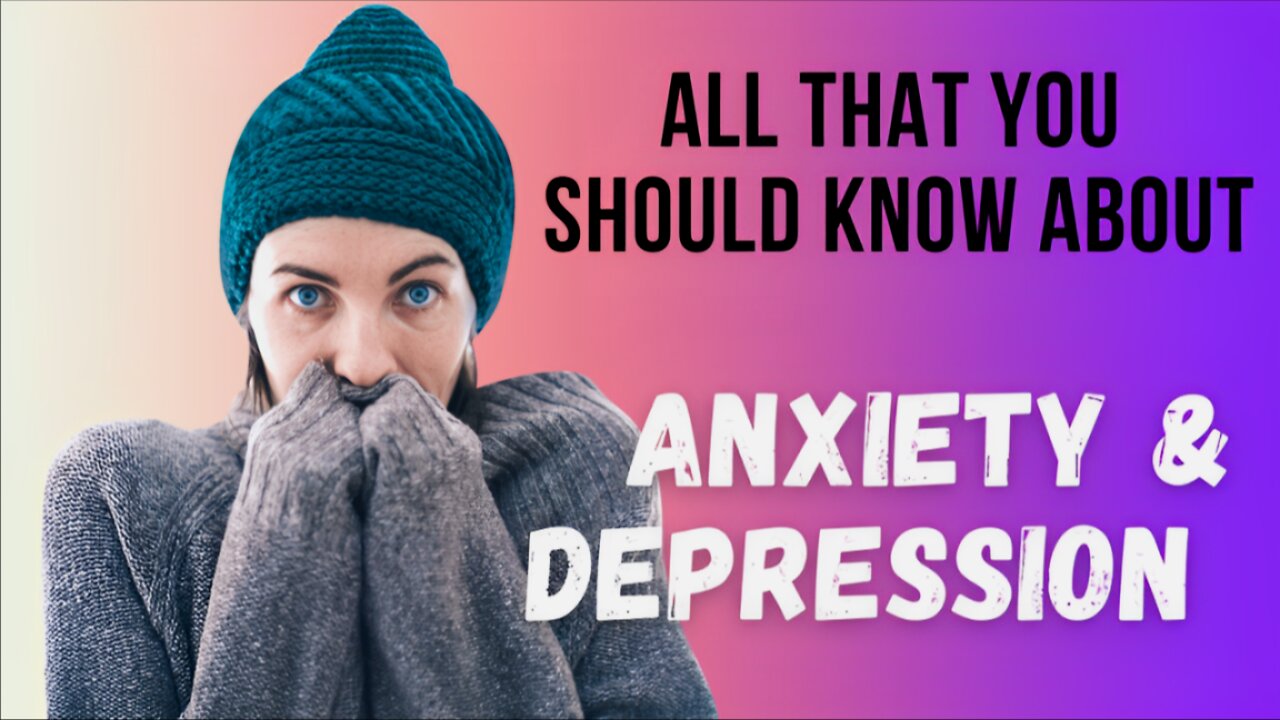Premium Only Content

Anxiety and depression, causes, symptoms and treatment
Anxiety and depression, causes, symptoms and treatment
#anxiety #depression #health
depression, anxiety, depression and anxiety, anxiety depression, anxiety attack and depression,
"Hi everyone, welcome back to HealthCare Provider. Today, we're diving into an incredibly important topic: anxiety and depression. These mental health conditions affect millions of people around the world, and it's crucial to understand them better. In this video, we'll be discussing what anxiety and depression are, their symptoms, causes, and most importantly, how to cope. Remember, you're not alone in this, and there is help available. Let's get started."
2. What Are Anxiety and Depression?
"First, let's define anxiety and depression.
Anxiety is a feeling of worry, nervousness, or unease about something with an uncertain outcome. It's a natural response to stress, but when it becomes excessive, it can interfere with daily life.
Depression, on the other hand, is a mood disorder that causes persistent feelings of sadness and loss of interest. It affects how you feel, think, and handle daily activities."
3. Symptoms
Excessive worry
Restlessness
Fatigue
Difficulty concentrating
Irritability
Muscle tension
Sleep disturbances
For depression, symptoms can include:
Persistent sadness or low mood.
Loss of interest in activities once enjoyed.
Changes in appetite or weight.
Sleep disturbances.
Loss of energy or increased fatigue.
Feelings of worthlessness or guilt.
Difficulty thinking, concentrating, or making decisions.
Thoughts of death or suicide
Remember, these symptoms can vary from person to person."
4. Causes and Risk Factors
"So, what causes anxiety and depression? There isn't a single cause, but a combination of factors can contribute. These can include:
Genetics: A family history of mental health conditions can increase risk.
Brain chemistry: Imbalances in neurotransmitters may play a role.
Life events: Stressful or traumatic events can trigger anxiety and depression.
Medical conditions: Certain medical issues can contribute to these conditions.
Risk factors include having a family history of mental health conditions, experiencing trauma or stress, and certain personality traits."
"Now, let's discuss some coping strategies. Here are a few ways to manage anxiety and depression:
Lifestyle changes: Regular exercise, a healthy diet, and adequate sleep can improve mental health.
Relaxation techniques: Practices like meditation, yoga, and deep breathing exercises can reduce stress.
Professional help: Therapy and medication can be very effective. Cognitive-behavioral therapy (CBT) is particularly helpful for both anxiety and depression.
Support network: Talking to friends, family, or support groups can provide emotional support.
When to Seek Professional Help
"It's crucial to recognize when self-help isn't enough. If your symptoms are severe, persistent, or interfering with daily life, it's time to seek professional help. . Don't hesitate to reach out."
"Thank you for watching! Don't forget to share this video with anyone who might benefit from it. Take care and see you next time!"
-
 2:48
2:48
Steven Crowder
1 day agoCROWDER CLASSICS: What’s This? | Nightmare Before Kwanzaa (Nightmare Before Christmas Parody)
324K13 -
 33:49
33:49
Quite Frankly
1 day agoThe Christmas Eve Midnight Telethon
123K22 -
 2:12:46
2:12:46
Price of Reason
1 day agoAmber Heard BACKS Blake Lively Lawsuit Against Justin Baldoni! Is Disney CEO Bob Iger in TROUBLE?
73.2K24 -
 1:01:17
1:01:17
The StoneZONE with Roger Stone
21 hours agoChristmas Edition: Why the Panama Canal is Part of the America First Agenda | The StoneZONE
142K51 -
 18:12:15
18:12:15
LFA TV
1 day agoLFA TV CHRISTMAS EVE REPLAY
153K19 -
 13:32
13:32
Scammer Payback
23 hours agoChanging the Scammer's Desktop Background to his Location
21.1K6 -
 4:21
4:21
BIG NEM
1 day agoNikola Tesla's Secret to Cultivating Creativity & Genius
16.1K1 -
 15:03
15:03
The Anthony Rogers Show
2 days agoAnthony Rogers - Live at Cusumano's Pizza (Upstairs)
12.7K1 -
 4:33:48
4:33:48
tacetmort3m
1 day ago🔴 LIVE - THE ZONE KEEPS PULLING ME BACK - STALKER 2 - PART 15
76.5K13 -
 22:45
22:45
Brewzle
1 day agoI Went Drinking In A Real Bourbon Castle
54.5K4